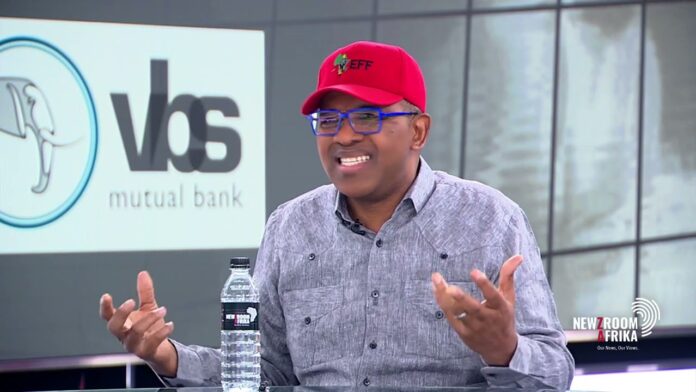Former EFF chair Dali Mpofu asserts the party’s acceptance of funds from VBS Mutual Bank does not equate to wrongdoing
On July 15, 2024, Dali Mpofu, the former national chairperson of the Economic Freedom Fighters (EFF), addressed the ongoing controversy surrounding the party’s acceptance of donations from the now-defunct VBS Mutual Bank. Despite the bank’s notorious collapse and its impact on pensioners, Mpofu maintained that the EFF has never denied receiving funds.
In a recent interview with Newzroom Afrika, Mpofu responded to criticisms aimed at the party for allegedly benefiting from illicit sources. He pointed out that the EFF has consistently acknowledged its receipt of donations from VBS and rejected any claims of criminal activity linked to these transactions.
The scrutiny intensified following the sentencing of Tshifhiwa Matodzi, the former chairperson of VBS Mutual Bank, who received a 15-year prison term after pleading guilty to serious offences, including corruption and fraud. In his testimony, Matodzi claimed that he made substantial donations to the EFF to secure favourable media coverage and silence criticism regarding a controversial loan to former President Jacob Zuma.
Matodzi alleged that the EFF received a lump sum of R5 million followed by monthly payments of R1 million, funneled through a company owned by Floyd Shivambu’s brother, Brian. Mpofu, however, dismissed Matodzi’s affidavit as lacking new information and argued that it did not implicate the EFF in any wrongdoing.
“Nothing new comes out of that affidavit, nothing at all,” Mpofu stated, insisting that donations are a common practice among political parties. He challenged the narrative of corruption, asking, “Where’s the fraud? Where’s the money laundering?”
As criticisms mounted, the EFF shared a video of Julius Malema from four years ago, reaffirming the party’s position. In the clip, Malema declared, “There’s nothing anyone can say that will shake us. There’s nothing the EFF has done illegally.”
In response to the allegations, Shivambu echoed these sentiments, emphasizing that attempts to link the EFF to VBS are motivated by political opportunism. He firmly stated, “I have no dealings with VBS,” calling such connections desperate attempts at political gain.
Analysis:
Political: The controversy surrounding the EFF and VBS donations underscores a critical intersection of politics and finance. Political parties often navigate complex relationships with financial institutions, and the EFF’s acknowledgment of these donations raises questions about the integrity of funding sources. Mpofu’s defense reflects a broader trend where parties must justify their financial dealings to maintain public trust.
Social: This situation reflects societal debates on transparency and accountability in political funding. The EFF’s insistence on the legitimacy of its donations highlights a growing demand from the public for clearer communication regarding the sources of political financing. The community’s trust hinges on the perception that parties operate above board, especially in light of past scandals.
Racial: The discourse surrounding the EFF often intersects with issues of race and economic justice. As a party advocating for the rights of marginalized communities, the criticism regarding VBS donations presents a challenge to its narrative. The EFF must navigate perceptions of exploitation versus empowerment, particularly in a racially charged political landscape.
Gender: Gender dynamics also play a role in this narrative. The visibility of female voices within the party and the broader discourse on leadership influence perceptions of accountability. As political parties confront allegations of misconduct, the representation of women in leadership positions can impact public response and party credibility.
Economic: The economic implications of the VBS collapse resonate deeply within South Africa. The fallout from the bank’s mismanagement continues to affect vulnerable populations, including pensioners. The EFF’s association with VBS complicates its economic messaging, challenging the party to reconcile its political actions with its stated goal of economic liberation.
